Coronavirus Australia live news: shutdown casualties and where they are; NSW gyms, salons may be next to reopen
Analysis shows jobs lost early in the collapse are not coming back until the shutdown of tourism and hospitality is eased.
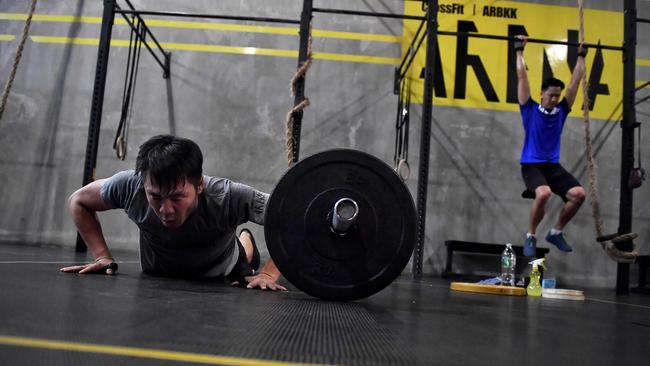
- Those who lost jobs in Australia and where
- Numbers nationally and globally at 6pm AEST
- Gyms, beauty salons may be next in NSW
- Tourism lobby’s attack on Premier
- ‘Reopen states ASAP’, Beattie says
- 70,000 jobs revived by NSW pubs plan
- JobKeeper’s $60bn budget windfall
Welcome to live coverage of the continuing coronavirus crisis. China reports zero new cases officially for the first time, and analysis points to urgency in reviving Australian domestic tourism, while Boris Johnson’s office defends a top aide over a shutdown breach.
Wall Street Journal 12.55am: US death toll nears 100,000 and is world’s highest
The number of confirmed deaths in the US caused by the new coronavirus surpassed 96,000, the highest known national tally globally, according to new data from Johns Hopkins University. More than five million people have been infected world-wide, with over 1.6 million of those cases in the US, the data showed.
President Donald Trump called on US state governors on Friday local time to reopen the nation’s places of worship as “essential services”, pointing to new safety guidelines from the US Centres for Disease Control and Prevention. He said he would “override” any governors who don’t agree, though he didn’t specify how he would do that.
While some states have already allowed houses of worship to reopen, others— such as Rhode Island—aren’t yet planning to do so, despite the President’s statement.
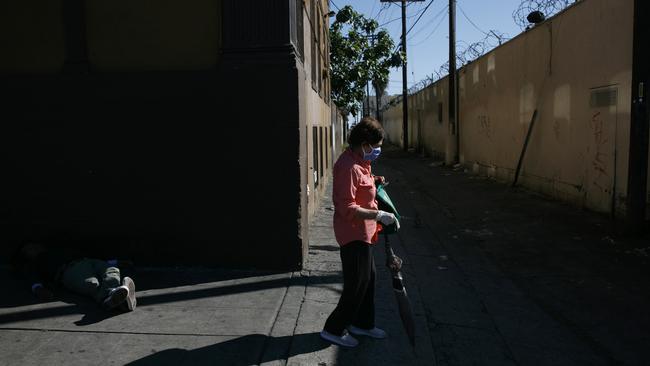
Nevada Governor Steve Sisolak said his state aimed to reopen casinos on the Las Vegas Strip and elsewhere on June 4. New York announced that areas like Long Island could reopen as early as this coming week.
As the pace of state reopenings accelerates, shutdowns are continuing to pressure the American labour market. On Thursday, new data showed that about 2.4 million Americans filed for unemployment benefits for the week ending May 16. For all of April, US employers cut more than 20 million jobs.
AAP 12.45am: Pandemic costs alcohol industry $8.5bn
The beer, wine and spirits industry has suffered its worst month in history as a result of the coronavirus pandemic, with the loss of $8.5 billion in revenue in April, despite reports of a bottle-shop sales boom.
The shutdown of pubs, clubs and bars to spare Australia’s from the worst of the deadly virus also cost the industry almost half a million in hospitality jobs, Alcohol Beverages Australia says.
“Despite some initial pantry filling in March, April has been the worst month on record for sales of beer, wine and spirit,” its chief executive Andrew Wilsmore said in a statement on Sunday morning.
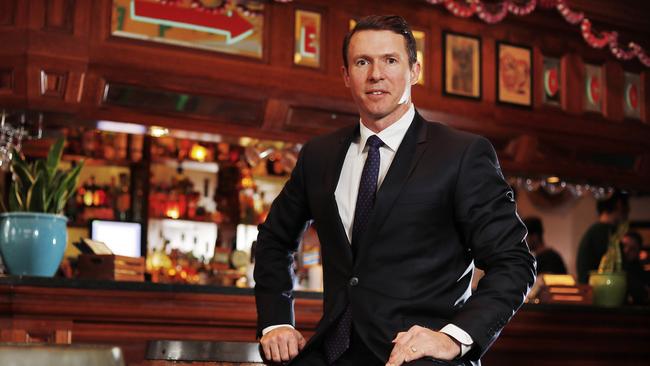
READ MORE: Alcohol industry suffers virus hangover
Wall Street Journal 12.40am: Muslims ban some gatherings as Ramadan ends
Many countries in the Muslim world have marked an end to the holy month of Ramadan with fresh restrictions on mass gatherings.
The costs of prolonged lockdowns have forced governments around the world to weigh how to reopen economies without posing significant risks to public health.
The religious holiday of Eid al-Fitr, which typically celebrates the end of a month of fasting and begins in many places on Saturday, has complicated these calculations. Some leaders are urging Eid prayers be confined to the home and large gatherings hosted only over the internet.
“Eid this year is different from all other years,” Dubai’s ruler, Sheikh Mohammed bin Rashid al-Maktoum, wrote on Twitter on Saturday. “The affection and love and communication is remote.”
The United Arab Emirates has recorded nearly 28,000 infections and 237 deaths from the disease.
Egypt is set to go into a strict five-day lockdown for Eid starting on Sunday , with all public transportation, shops, beaches and parks closed and a curfew in place from 5pm to 6am. Egyptian officials have said that the country cannot afford the economic cost of a prolonged lockdown, and recently rolled out a plan for the country to “coexist” with the virus.
In Afghanistan, officials have tightened restrictions in Kabul for Eid, closing roads in the capital and highways connecting it to other cities. The new measures come after Kabul residents flouted earlier restrictions on gatherings.
In Iran, an early hot spot for the virus, the restrictions imposed on shrines and mosques to curb infections have begun to ease. Eid prayers will be held under state hygiene guidelines in mosques in most parts of the country. And holy shrines—some of which were vectors for the virus—are slated to reopen Monday. But even in low-risk areas, large gatherings remain banned.
Agencies 9pm: New cases zero in China but surge in Latin America
New coronavirus cases dropped to zero in China for the first time on Saturday in official figures but overwhelmed hospitals across Latin America – both in countries lax about shutdowns and those lauded for firm, early confinement. The virus hit a reopened church in Germany and possibly a restaurant, too.
The pandemic’s persistence stymied authorities struggling to keep people safe and revive their economies at the same time, disrupting the Memorial Day weekend in the US and collective celebrations around the Muslim world marking the end of the holy month of Ramadan.
The US has been the hardest-hit country, with more than 96,000 deaths among 1.6 million confirmed cases, followed by Russia and Brazil, according to the Johns Hopkins count.
As deaths and infections surge across Latin America, experts note the limits of government action in a region where millions have informal jobs and many police forces are weak or corrupt and unable to enforce restrictions.
Brazil and Mexico reported record numbers of infections and deaths almost daily this week, fuelling criticism of their presidents for limited shutdowns. But infections also rose and intensive-care units were swamped in Peru, Chile and Ecuador, all countries lauded for imposing early and aggressive business shutdowns and quarantines.
One bright spot emerged Saturday: China, where the outbreak began late last year, reported no new confirmed cases for the first time.
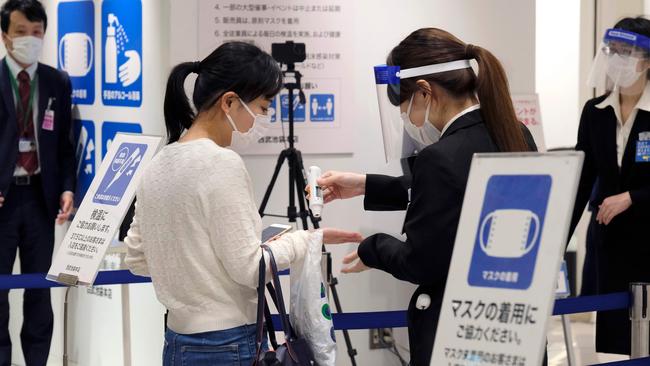
Japan’s new cases have dwindled to double-digit figures each day and the country is gradually reopening. Guidelines were released on Saturday for bar hostesses and other night-life workers to wear masks, gargle every 30 minutes and disinfect karaoke microphones after each use.
In South Korea, more than 200 recent infections have been linked to clubgoers in Seoul as the country began easing restrictions.
While some countries are already facing signs of a second wave of infections, badly hit Russia is still struggling with its first.
Associated Press
John Black 8pm: The recovery clock is ticking for tourism jobs
Along with some renewed optimism, it’s now time for a bit of leadership from a national cabinet that is becoming national in name only, with some premiers forgetting they’re part of a bigger entity called Australia.
In the first stage of the jobs crunch, to April 4, 6.3 per cent of the labour market lost their jobs, led by low-paid young and older workers usually employed in the industries of accommodation and food in coastal and rural regions, and younger workers in arts and recreation in suburbs close to CBDs of our major cities.
Every state was impacted and the impact was massive. When you lose about 6.3 per cent of a labour market of 13 million jobs in three weeks, it tends to be noticed. It bears repeating that nearly 90 per cent of the damage inflicted on the jobs market by the national cabinet until April 4 took place as a direct result of the lockdown changes in this first stage.
The second stage, from April 4 to 18, deepened the cuts of stage one for younger and older workers in accommodation and food, and arts and recreation, across all states, but especially Queensland and SA. The national impact was a marginal drop of 0.8 per cent.
From April 18 to May 2, stage three’s job losses were dominated by the highly paid group of professional consultants, followed by those in wholesale, the media, real estate and manufacturing.
Cases of COVID-19 in the past 14 days have petered to zero, or near zero, levels in Queensland, Western Australia, South Australia, the ACT and Tasmania. Payroll data from the Australian Bureau of Statistics for the fortnight of April 18 to May 2 shows a recovery in jobs across the same states and territories, with the exception of WA, which remained steady.
The problem states as far as COVID-19 infections and continued job losses remain the big two: NSW and Victoria.
Unfortunately, the nation’s recovery cart has nine drivers, or governments, at the moment and the Queensland driver is up for re-election.
All the drivers need to realise it is reasonable to conclude that the jobs lost in the early stages of the collapse are not going to start coming back until the shutdown of tourism and hospitality, and restrictions on interstate travel, are wound back.
When it comes to tourism jobs, the clock is ticking for all states, but especially for Queensland, where tourism and hospitality rely heavily on the winter market. Some leadership is needed here, Scott Morrison.
READ MORE: Big-picture view needed to get workers back
ALSO: Madness, says Jeff Kennett | Premier urges states to reopen borders | Palaszczuk sorry but firm on border bans | ‘Open borders to interstate tourists’
Agencies 6.20pm: Boris Johnson under pressure to sack aide
Shutdown questions continue to bombard the British government with the Prime Minister facing pressure to sack his closest aide after it emerged that he travelled to his parents’ home despite coronavirus-related restrictions.
Police have confirmed they attended a property in County Durham after it emerged that Dominic Cummings travelled more than 400 kilometres from his London home during the restrictions that his boss had just announced.
Following the easing of some shutdown measures last week, there are no restrictions on how far people can go to get to the countryside, national parks and beaches in England.
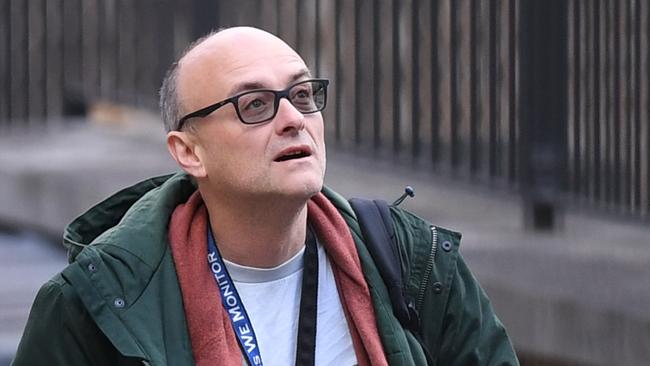
According to a joint investigation by the Daily Mirror and The Guardian, at the same time as the UK Government was instructing people to remain home – with fines in place for those contravening the rules – Mr Cummings decided to escape the capital.
He is said to have been present at his family home when police from Durham Constabulary turned up on March 31, following a call from someone reporting they had seen Mr Cummings in the area.
Similar examples of public officials ignore lockdown guidelines have led to resignations and condemnation from senior Tories.
Mr Johnson’s office said in a statement that Mr Cummings made the trip because his wife was showing coronavirus symptoms, he thought he was likely to also get sick, and relatives had offered to help look after the couple’s young son.
It said Mr Cummings stayed in a house “near to but separate from” his extended family. Downing St. said Cummings believed he had behaved “reasonably and legally”.
Mr Cummings, a contentious figure who has a spiky relationship with the media, was one of the architects of the successful campaign to take Britain out of the EU, and later was appointed Mr Johnson’s top aide.
Press Association
AAP 6pm: Coronavirus by the numbers
Australia has recorded 7106 cases as of 6pm AEST. There are 510 active cases. South Australia, the ACT and Northern Territory have no active cases.
- The national death toll is 102 – NSW 50, Victoria 19, Tasmania 13, WA 9, Queensland 6, SA 4, ACT 3. (Two Queensland residents who died in NSW have been included in both state’s counts.)
- More than six million of an estimated 16m people with smartphones have registered for the federal government’s COVIDSafe tracing app since April 26.
- Victoria confirmed the death of a man in his 60s, bringing the state’s death toll to 19. Victoria recorded 10 new COVID-19 cases since Friday bringing state total to 1602.
- A nurse who continued to show up to work at an aged-care home with symptoms of COVID-19 has been referred to Queensland’s anti-corruption body.
- The alcohol industry suffered a $8.5 billion drop in revenue and the loss of nearly half a million hospitality jobs in April because of the COVID-19 crisis.
- GLOBAL: Cases: at least 5,213,991. Deaths: at least 338,249. Recovered: at least 2,058,237.
The Times 5.30pm: Trump drug increases your risk, warn experts
Contaminated surfaces are not thought to be significant in the spread of coronavirus, according to US health officials, as scientists said that an anti-malarial drug promoted by President Trump had no benefit and increased the risk of death.
Close contact with an infected person is the primary way of catching the virus, according to the latest advice from the Centers for Disease Control and Prevention (CDC), the main US public health body.
“COVID-19 spreads mainly through close contact from person to person,” it said after a review downgraded the role of contaminated surfaces.
The largest study of the antimalarial drug hydroxychloroquine as a treatment in 671 hospitals “suggests … no benefit for patients with Covid-19”, according to research in The Lancet.
President Trump touted the drug, in combination with the antibiotic azithromycin, as “a real chance to be one of the biggest game changers in the history of medicine”. He took a course of hydroxychloroquine as a preventive measure for two weeks.
The study observed nearly 15,000 patients who received the drug either alone or in combination with antibiotics, against 81,000 who did not. “Treatment with these medications among patients with Covid-19, either alone or in combination … was linked to an increased risk of serious heart rhythm complications in these patients,” researchers, led by Mandeep Mehra, of the Brigham and Women’s Hospital Center for Advanced Heart Disease in Boston, said.
READ MORE: Not dancing, hurting
Agencies 5pm: SA businesses to get ‘flexible’ guidelines
With eased coronavirus restriction allowing for more diners in South Australian restaurants, cafes and pubs, larger businesses will soon have more clarity around the number of customers they can accommodate.
With the state’s second stage beginning on June 5, Premier Steven Marshall said the “more flexible” guidelines will be released on Monday.
Larger hospitality venues with multiple segregated areas will have a clearer understanding if they can accommodate 20 people per section as opposed to it being the total patron number.
“We are very open to anything we can do to get businesses back to profitability,” Mr Marshall said.
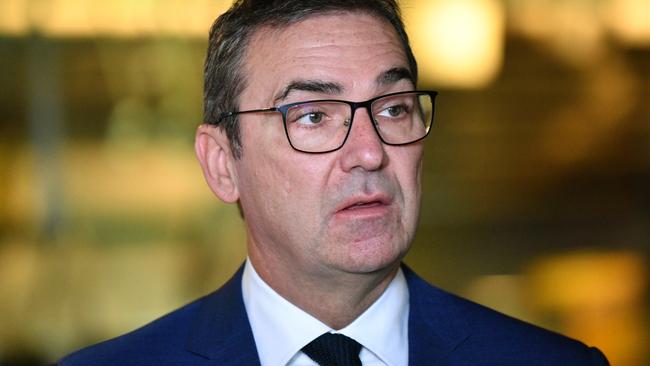
“The continued good result and high level of testing have given us a lot of confidence.” The stage two protocols extend to beauty salons, gyms and churches and will see cinemas and theatres open.
Mr Marshall said the responsibility of interpreting and implementing the guidelines would rest upon individual businesses, ensuring the venue is COVID-safe.
READ MORE: The worst of times: world’s cultural centre may never recover
Agencies 4.30pm: Gyms, beauty salons may be next
The NSW government has flagged the “imminent” reopening of gyms and beauty salons as the state over the next two weeks prepares for a landmark easing of COVID-19 restrictions.
The government remains cautious yet bullish after three cases of coronavirus were recorded over the preceding 24 hours.
All three were overseas acquired – two from Pakistan and one from the USA – and were already in hotel quarantine meaning they didn’t represent a risk of onward infection.
Premier Gladys Berejiklian has announced that from June 1, up to 50 people will be allowed in restaurants, pubs and cafes.
Regional travel restrictions will also ease while museums, galleries and libraries will also be allowed to open.
That has been met with a chorus of industries clamouring for the government to allow them to resume trading.
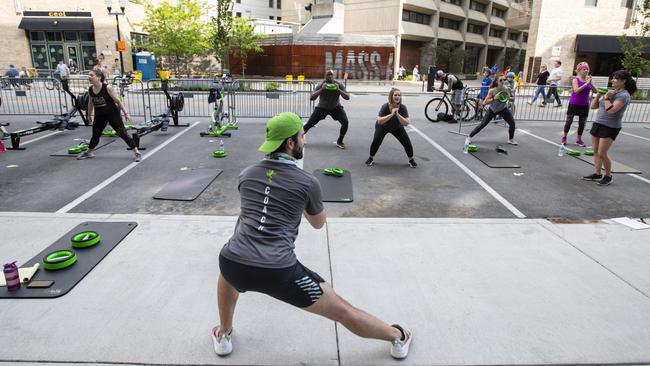
Lobby group Fitness Australia on Saturday called for the Berejiklian government to allow gyms to re-open sooner than pubs, saying they already had a COVID industry framework in place.
The government is also under pressure to open beauty parlours, although Health Minister Brad Hazzard on Saturday said it would need to work with the industry given the close-contact nature of it.
“The government is keen that this state leads the way,” Mr Hazzard said. “The premier has made the point that she’s being lobbied about half the population on beauty therapists.
“It’s front and centre, we’re talking to the industry and have to make sure that we can get COVID safe plans and it’s imminent that we make some announcements in that regard.”
Dow Jones 3.10pm: Car rental giant Hertz hits the wall
Hertz Global Holdings, one of America’s largest car-rental companies, filed for bankruptcy protection Friday night in the US, saddled with about $US19 billion ($29 billion) in debt and nearly 700,00 vehicles that have been largely idled because of the coronavirus.
The Florida-based company entered chapter 11 proceedings in the US Bankruptcy Court in Delaware, hoping to survive a drop-off in ground traffic from the pandemic and avoid a forced liquidation of its vehicle fleet.
The company’s collapse marks one of the highest-profile corporate defaults stemming from the pandemic’s impact on air and ground travel, though Hertz also had challenges before the current economic crisis.
Read the full story here.
The Times 2.30pm: Putin strongman taken out by virus
Ramzan Kadyrov, the leader of Chechnya and one of President Putin’s most important allies, was reported to be in a critical condition yesterday after being flown to a Moscow hospital with suspected coronavirus.
Mr Kadyrov, 43, has ruled Chechnya with an iron fist since 2007. A former separatist, he went over to the Kremlin in 2000. He has no clear successor.
Tass, a state-run news agency, said Mr Kadyrov was flown in his private plane to Moscow on Thursday evening. Baza, a website with links to the security services, said the Chechen leader had suffered damage to his lungs and was in a critical state. Tass said he was “stable”, but gave no further details.
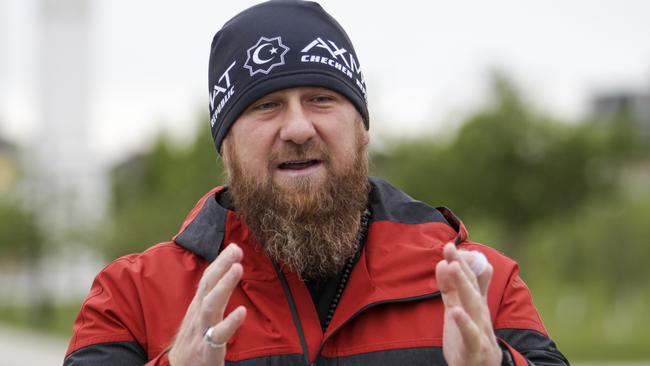
The Kremlin has not commented. Chechen government officials have stressed that Mr Kadyrov remains in control of the republic, but have not explicitly denied the reports. Critics say Mr Putin, 67, has allowed Mr Kadyrov to turn Chechnya into his personal fiefdom in exchange for suppressing insurgency in the region.
READ MORE: The future of air travel
Penny Hunter 2pm: ‘Everyone desperate to get the heck out’
After weeks of COVID-19 lockdown, Australians are embracing the domestic holiday dream — but with critical caveats. With almost all borders closed, they don’t want to drive too far from home; they’re not keen to share their space with strangers; and health and safety concerns are paramount.
Mountain cabins, luxury homes, caravans and campsites, and remote island hideaways are all on the agenda for consumers desperate for a change of scenery, and pent-up demand is fuelling a boom in inquiries and bookings.
Luxico, a high-end holiday rental agency with 250 properties in the eastern states, has had a doubling of inquiries so far this month, compared with last year.
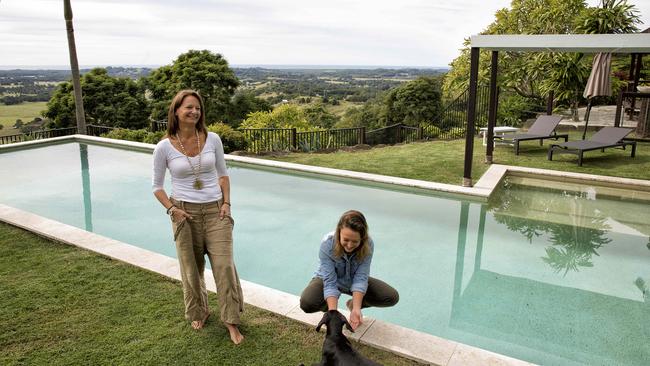
Founder Alexandra Ormerod said this week’s announcement that travel restrictions would lift in NSW on June 1 had sparked an influx of bookings for Byron Bay, the south coast and Palm Beach. She said her clientele was cautious, seeking self-contained seclusion and a sense of personal safety in the wake of the pandemic.
“Everyone’s desperate to get the heck out of their house,” she said, adding: “The big change this week has been consumer confidence to confirm bookings now that they know it’s OK to travel.”
Read the full story here.
Agencies 1.30pm: Cruise links to WA virus cases
Western Australia has recorded no new cases of COVID-19 overnight for the ninth consecutive day, but three historical cases have been confirmed. The Health Department said two of the cases were related to cruise ships and had recovered before returning to WA, while the other had travelled overseas and also had contact with a confirmed case.
She self-isolated when she was ill as a precaution.
All three cases, which were identified through blood tests, are no longer infectious and do not carry any ongoing risk to the public.
They bring the state’s total to 560.
There are now only two active cases in WA, down from three on Friday, and none in the regions.
Those patients are not in hospital.
READ MORE: Adam Creighton — Curve’s crushed, now let’s get on with it
Imogen Reid 1pm: Victoria records further death, Qld cases up by two
A man in his 60s has died in Victoria from COVID-19, bringing the national death toll to 102.
The state’s deputy chief health officer Dr Annaliese van Diemen confirmed the death on Saturday, saying the man died in hospital, the 19th death recorded in Victoria.
Ten new cases were reported in the state, where there have been 1602 cases.
Meanwhile, Queensland has recorded two additional cases on COVID-19 in the past 24 hours, with only 13 active cases remaining.
The state’s total number of cases is 1060 with 172,212 tests conducted so far.
READ MORE: Chris Kenny — Nanny state in no rush to return our liberties
Imogen Reid 12.30pm: ‘Don’t be fearful’: Health Minister urges more testing
NSW Health Minister Brad Hazzard has urged more people to come forward for testing, with almost 9000 people tested in the past 24 hours.
“We are still doing OK, but I must say, as the Health Minister, I would love to see a lot more people coming forward,” Mr Hazzard told reporters on Saturday.
“That is absolutely essential as we move forward and as we try to relax the restrictions that we have lived under for the past two months, it is crucial, absolutely crucial, that people come forward for testing if they have the slightest hint, the slightest hint, of any respiratory issues at all, a cough, a cold, temperature, whatever it may be.”
Three additional COVID-19 cases were reported in NSW overnight, taking the state’s total to 3086. A total of 411,618 people have been tested as the state closes in on half a million tests. So far, 2653 have recovered from the virus.
Mr Hazzard said 408,532 have returned negative results, and reiterated the importance of being tested, particularly in young people who might be asymptomatic.
“Don’t be fearful of coming forward and being tested. You are keeping yourself, you are keeping a family, you’re keeping your community safe, and also, the chances are your test is going to be negative,” he said.
“I want to emphasise again the danger of young people who might be asymptomatic or who might have mild symptoms.
“The impact of those young people, particularly as we are freeing up our restrictions, particularly around clubs and hotels and so on, we need a very powerful message and reminder to the fact that these young people who may think they are invincible are actually not invincible.”
READ MORE: Gerard Henderson — We’re in bettershape than most
Christine Kellett 12pm: NSW Health Minister to address the media
You can watch our live stream here:
Sarah Elks 11am: Tourism sector turns on Queensland Premier
The Gold Coast tourism sector has launched an extraordinary attack on Annastacia Palaszczuk over the border stoush, accusing her of turning a “slip of the tongue” into bad public policy that will cost the city half a billion dollars.
Destination Gold Coast CEO Annaliese Battista — who represents the region’s major tourism operators, including airports, hotels and theme parks — said the area’s $5.9bn tourism industry was being made the “sacrificial lamb” of the Queensland Premier’s mixed messages on when the state’s border should reopen.
“A mistake is acceptable, but what’s unforgivable is to turn it into public policy … that will take $500m out of the pockets of mum-and-dad tourism operators on the Gold Coast,” Ms Battista said.
“The sector feels ignored or too easily dismissed by the Premier. We’re being made into the sacrificial lamb, without a genuine understanding of the reliance on tourism of the largest non-capital city in Australia. Politics is coming before good sense and reason. We urge the Premier to reconsider.”
The tourism industry was shocked this week when Ms Palaszczuk said Queensland borders may not reopen until September. Operators had been placing their hopes on the state’s written “roadmap” which said interstate travel might restart from July 10, subject to “further planning and review”.
Read the full story here.
Imogen Reid 10.15am: Labor seizes on $60bn JobKeeper ‘doozy’
Anthony Albanese has slammed the government’s $60bn JobKeeper accounting error, accusing Scott Morrison of misleading the Australian people and a Senate committee on the COVID-19 response.
The Opposition Leader said the government was “arrogant,” criticising Treasurer Josh Frydenberg for providing a false declaration.
Mr Albanese wants to see the payment extended to people who missed out in the first place, including casual workers and areas like the arts and entertainment sector.
“This $60bn mistake is a doozy and it comes at a time, as we know that of a week ago, Australians who are struggling had taken $13.2bn out of their own superannuation accounts,” Mr Albanese told reporters on Saturday.
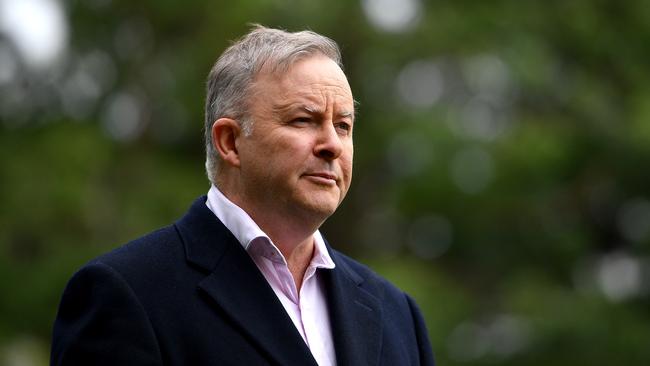
“This is a government that should have rolled out this program in an orderly way, but they didn’t. They said no to wage subsidies when parliament first met and only were dragged to it by the knowledge that without wage subsidies there would have been substantially more people joining the Centrelink queue.
“But what we see with this government and this error is a $60b mistake that they didn’t bother to inform the Australian people of until Friday afternoon.”
Mr Albanese said the credibility of the Treasurer Frydenberg and Assistant Treasurer Michael Sukkar has plummeted.
“They need to fess up and say when they made this error and when they discovered this error and why they dropped it out on a Friday afternoon,” he said.
“Why they continued to mislead the Senate committee on the COVID-19 response and why Australian people were told something very different because what they’re saying is that up to 1,000 companies who has one employee put down $1500, exactly the same number that were eligible for JobKeeper on a form and no one noticed.”
READ MORE: Disaster awaits when money-go-round stops
Agencies 9.30am: Infected nurse referred to Qld corruption commission
A nurse who continued to show up to work at an aged-care home with symptoms for COVID-19 has been referred to Queensland’s anti-corruption body. The nurse continued working at the North Rockhampton Nursing Centre while she was sick, but before she received test results.
She was suspended while an investigation is underway and is now in home isolation.
However, the health department have also referred her to the Crime and Corruption Commission over an alleged breach of the Chief Health Officer’s directions.
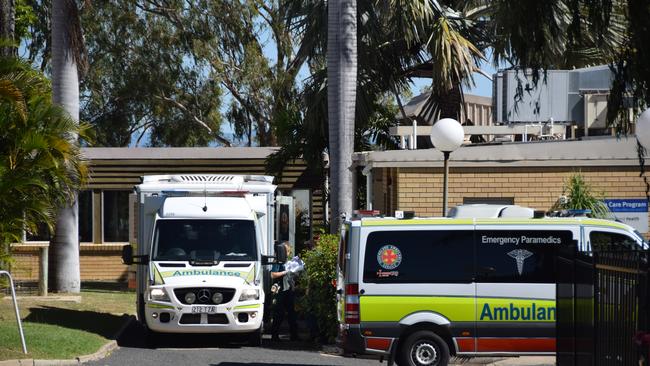
“Our focus remains on controlling COVID-19 and reducing its spread and protecting North Rockhampton Nursing Centre residents and staff, and the community, from infection,” a department spokesperson said.
“The most important thing is that every single Queenslander knows that if they have symptoms they should get tested immediately and stay at home until the tests are returned.” The department is finalising the terms and references for an external investigation.
READ MORE: Misery loves company, but it’s not party time
Damon Kitney 9am: Big government ‘hurting the economy’
One of the nation’s most senior business leaders, Charles Goode, has warned that the explosion of government intervention in society to deal with the coronavirus pandemic could lead to lower economic growth, a bigger welfare state and more left-wing political policymaking in the future.
The former ANZ and Woodside chairman also fears the role of the Reserve Bank could become increasingly politicised in the wake of the emergency action it has undertaken to respond to the pandemic crisis.
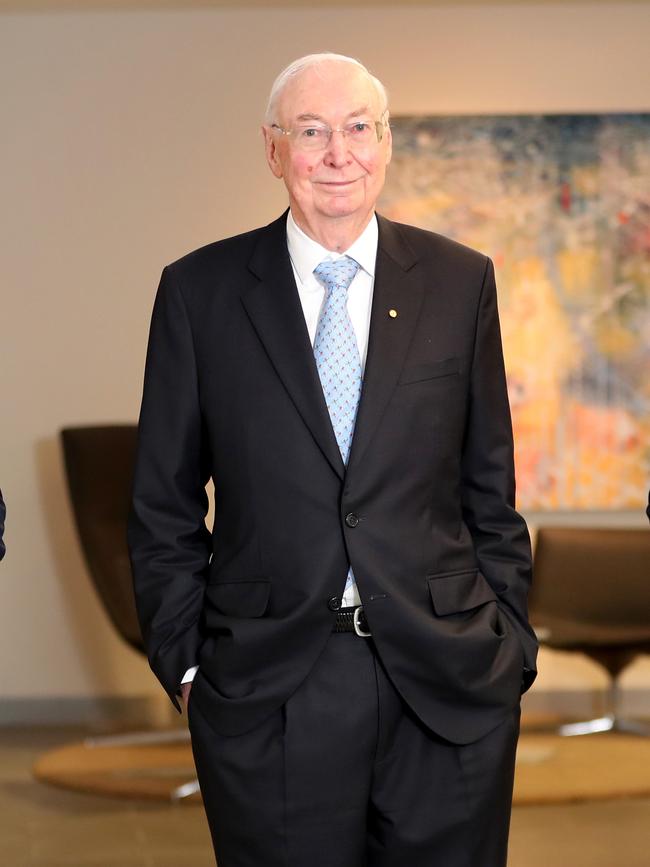
“We have wanted and accepted and needed much greater interference in our world,’’ Mr Goode said in a rare wide-ranging interview with The Weekend Australian in the offices of boutique corporate advisory group Flagstaff Partners, of which he is emeritus chairman.
“Sixty per cent of the working population works for the government or is supported by the government.
“It will be difficult for governments to withdraw this support. So I think we will have a greater government involvement in our society than previously. That may move the political needle to the left. That may lead to slower growth and a more welfarist society.
Read the full story here.
Natasha Robinson 8.30am: Aussies go for vaccine trifecta
A team of Melbourne researchers has created three vaccine candidates for COVID-19 using gene sequencing, in an emerging area of science that could unlock the ability of the immune system to fight the coronavirus.
Scientists at the Monash Institute of Pharmaceutical Sciences made the breakthrough, in work that mirrors that of US biopharma Moderna, whose surging stocks sent the US stockmarket soaring this week on the news that its vaccine candidate stimulated an effective immune response to SARS-CoV-2 in phase 1 human trials.
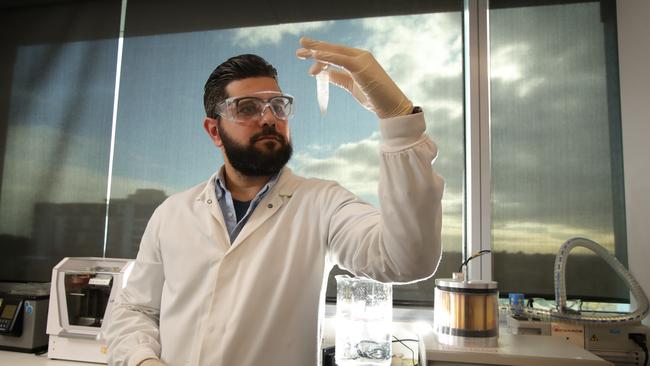
The Monash vaccine candidates use messenger RNA technology to induce the body to produce the coronavirus’s distinctive spike protein, triggering an immune response that they hope will lead to the production of antibodies against the virus.
The technology is part of a new frontier in vaccine development, which is being dubbed the “vaccine equivalent of a space race”.
Read the full story here.
Agencies 8am: Year 12s welcome exam date certainty
Victorian Year 12 students have been given the assurance they were looking for, that final exams will conclude this year and plans for 2021 can proceed as planned.
The Victorian government on Friday confirmed that Victorian Certificate of Education exams would conclude by early December, only two weeks later than the pre-pandemic date.
This was welcome news to many school leavers wondering if their higher education plans for next year would be thwarted.
The encouraging news for Year 12s comes as they, along with Prep, Year 1, Year 2 and Year 11 students prepare to return to school from Tuesday. All remaining year levels will return June 9.
Victoria recorded another 12 COVID-19 infections on Friday, bringing the state’s total to 1593.
Five of the new cases are related to an outbreak at Cedar Meats in Melbourne’s west, bringing the number of cases linked to the abattoir to 111. Four returned travellers in hotel quarantine also tested positive, while two other new cases were detected through the community screening program.
READ MORE: ‘This virus doesn’t want to kill us’
Mark Sherman 7.30am: Coronavirus infections surge in Brazil, Mexico
The coronavirus pandemic accelerated across Latin America on Friday, bringing a surge of new infections and deaths, even as curves flattened and reopening was underway in much of Europe, Asia and the United States.
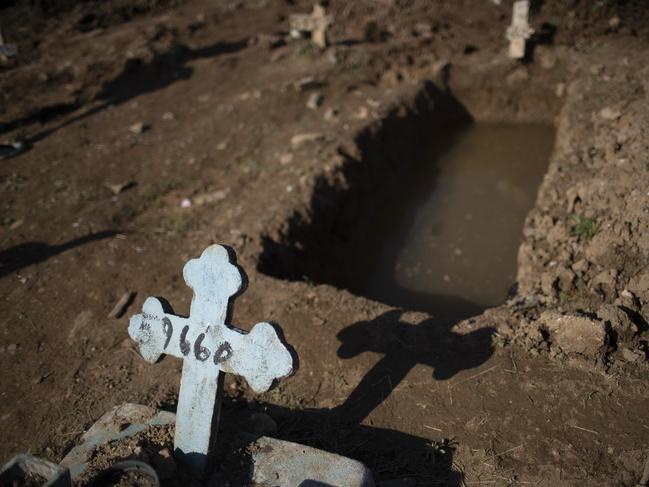
The region’s two largest nations — Mexico and Brazil — reported record counts of new cases and deaths almost daily this week, fuelling criticism of their presidents, who have slow-walked shutdowns in attempts to limit economic damage.
Brazil reported more than 20,000 deaths and 300,000 confirmed cases, making it the third worst-hit country in the world by official counts. Experts consider both numbers undercounts due to the widespread lack of testing.
Infections rose and intensive-care units were also swamped in Peru, Chile and Ecuador, countries lauded for imposing early and aggressive business shutdowns and quarantines.
Many experts said the rising death toll across Latin America showed the limits of government action in a region where millions labour in informal jobs and many police forces are weak or corrupt and unable to enforce restrictions.
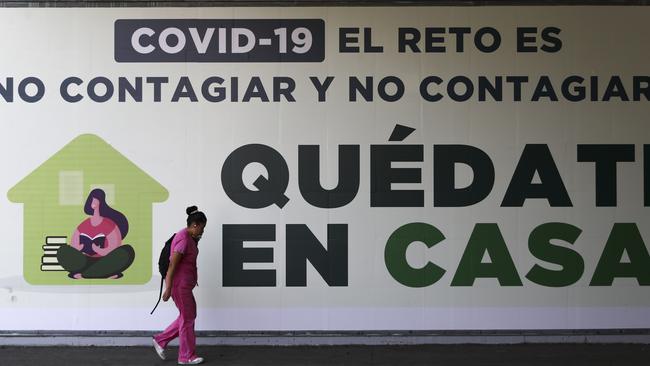
READ MORE: Ricky French — ‘This virus doesn’t want to kill us’
Marina Villeneuve 6.55am: Sparring over New York lockdown heats up
New York City’s mayor Bill de Blasio has unveiled a new set of data thresholds to help determine when to loosen restrictions imposed during the coronavirus pandemic — but his frequent political sparring partner, Governor Andrew Cuomo, said it would be up to the state, not the city, to make those decisions.
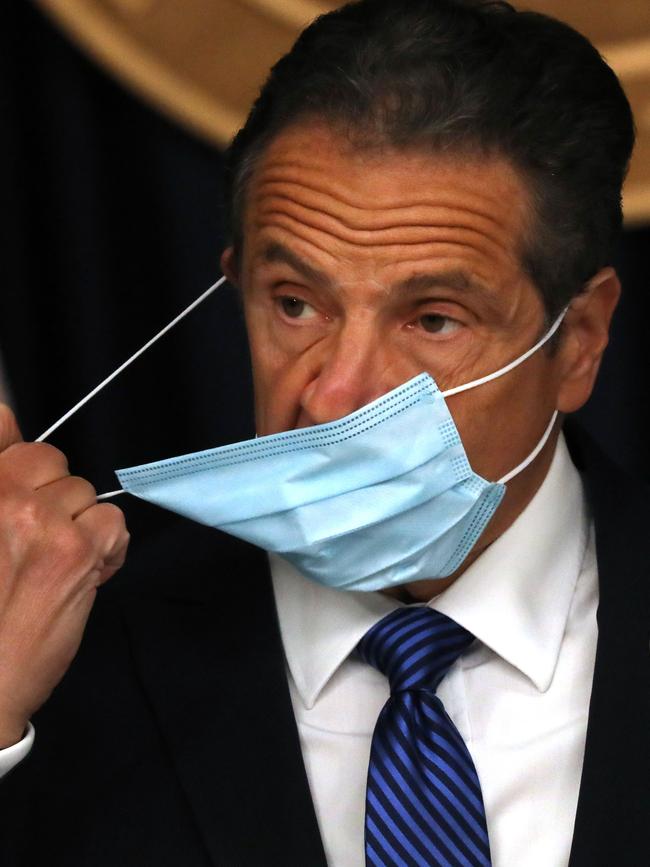
“No local official can open or close,” Mr Cuomo said, noting that the state has established its own set of metrics intended to measure the safety of reopening. “We said at the beginning it’s going to be one standard that is data-driven. There’s no politics here. What’s safe is safe,” the governor said.
The offices of both Democrats have been saying that the city, among the hardest hit in the world by the virus, is on target to begin reopening its economy in the first half of June.
Mr de Blasio said that in order to enter the first phase of the reopening, including manufacturing and retail with curbside pickup, the city must stay below thresholds for three things: the daily number of people admitted to hospitals for suspected COVID-19, the total number of patients in intensive care at public hospitals and the citywide percentage of people testing positive for the virus. — with Michael Hill, AP
READ MORE: US death toll set to top 100,000
Alistair Smout 6.03am: UK to introduce two-week quarantine for travellers
Britain will introduce a COVID-19 quarantine for travellers arriving from abroad from June 8, interior minister Priti Patel says.
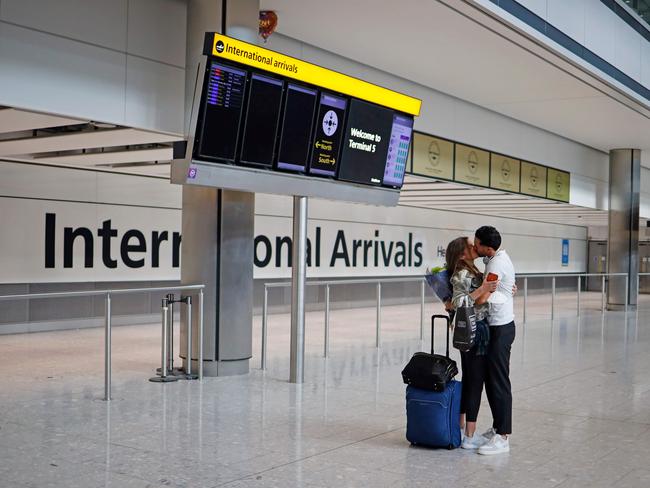
Airlines have warned the measure will devastate their industry. All international arrivals, including returning Britons, will have to self-isolate for 14 days and provide details of where they will be staying under the plans, which were criticised by airlines, business groups and politicians alike.
“Now we are past the peak of this virus, we must take steps to guard against imported cases triggering a resurgence of this deadly disease,” Ms Patel said at a news conference overnight (AEST).
Those who breached the quarantine in England could be fined £1000 ($A1800) and spot checks would be carried out by health and border officials. The quarantine will not apply to those arriving from the Irish Republic, nor to freight drivers, medical professionals and seasonal agricultural workers. The measures will be reviewed every three weeks.
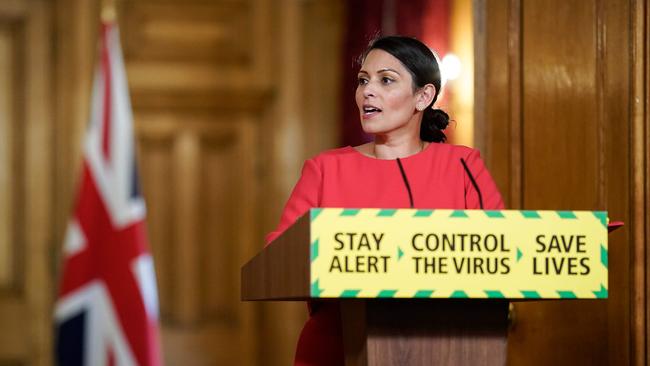
Transport minister Grant Shapps has also suggested the government would seek to negotiate “air bridges” for travellers coming from countries with low virus infection rates. — with Kylie MacLellan, REUTERS
READ MORE: Human progress ‘put into reverse’
Jill Colvin 5.45am: Trump orders governors to reopen churches
US President Donald Trump has deemed churches and other houses of worship essential and called on governors across the country to allow them to reopen.
“Today I’m identifying houses of worship — churches, synagogues and mosques — as essential places that provide essential services,” Mr Trump told a press conference at the White House, where he didn’t take questions.
He said if governors did not abide by his request, he would override them.
The Centres for Disease Control and Prevention had prepared a draft of reopening guidelines for churches and other houses of worship weeks ago that included measures like maintaining distance between parishioners and limiting the size of gatherings. But that guidance had been delayed for more than a month by the administration until Mr Trump changed course overnight (AEST).
“I said ‘you better put it out’. And they’re doing it,” Mr Trump said at a Ford Motor plant repurposed to make ventilators in Michigan. “And they’re going to be issuing something today or tomorrow on churches. We’ve got to get our churches open.” — with Zeke Miller, AP
READ MORE: Paul Kelly — World feels the chill of another cold war
Craig Johnstone 5.15am: Reopen states ‘as soon as possible’, Beattie says
Former Queensland premier Peter Beattie has joined the chorus of voices urging a swift reopening of state borders to help boost a tourism economy hit hard by the COVID-19 pandemic.
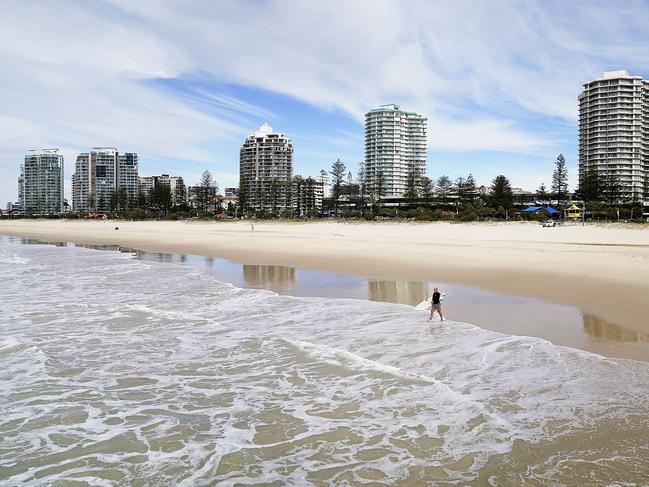
Mr Beattie insisted that Queensland, Western Australia, South Australia, Tasmania and the territories needed to rely on visitors from NSW and Victoria to keep their tourism industries afloat as Australia emerged from the COVID lockdown.
His stance contrasts with the Queensland government’s refusal to countenance any immediate lifting of border restrictions.
Campbell Newman — Annastacia Palaszczuk’s LNP predecessor as Queensland premier — said any job losses that resulted from the continuing border restrictions would become the Premier’s responsibility.
“The Premier has dug herself a hole and needs to climb out right now. It’s been a disastrous call and a major political mistake. I believe the community is now looking for a reopening of the border,” he said.
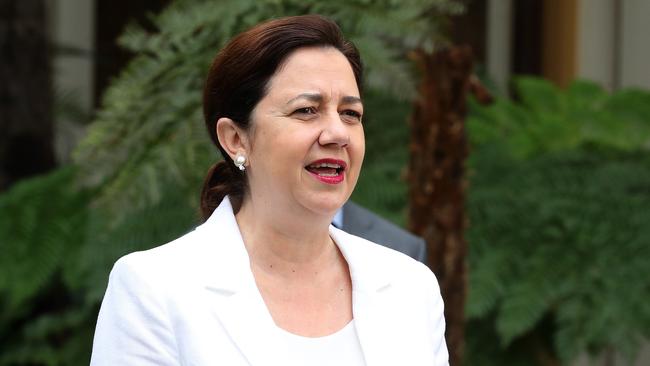
Read the full story, by Craig Johnstone and Sarah Elks, here.
Richard Ferguson 5am: 70,000 jobs revived by NSW’s push to reopen pubs
More than 70,000 jobs in NSW could be revived by Premier Gladys Berejiklian’s ambitious plan to allow gatherings of up to 50 people at a time in pubs, clubs and restaurants while other state economies remain shackled by onerous physical-distancing and border rules.
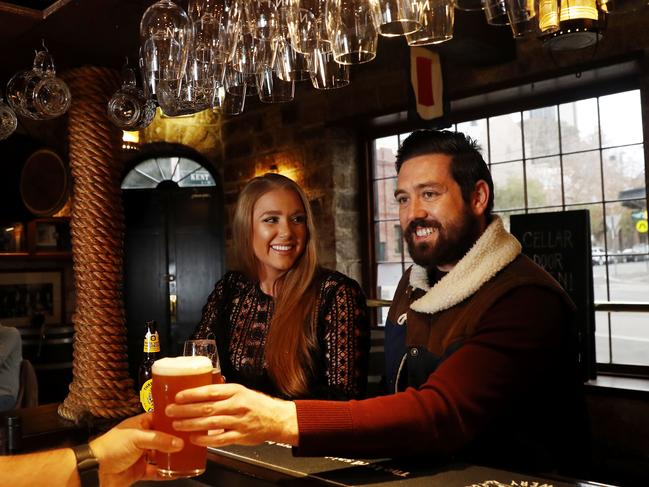
From June 1, NSW will allow 50 people at a time in a venue, with social distancing rules in place.
Australian Hotels Association NSW chief John Whelan said the 50-patron limit offered hope to 70,500 people who had lost their livelihoods.
“The entire hospitality sector has been hard hit by the COVID-19 crisis,” he said. “From June 1 we can start re-employing our staff and open up our hotels.”
Read the full story, by Richard Ferguson and Craig Johnstone, here.
Geoff Chambers 4.45am: $60bn windfall as JobKeeper called to account
A $60bn accounting error in Scott Morrison’s historic JobKeeper scheme has handed the government a shock budget windfall but reignited the campaign for generous wage subsidies to be extended to visa-holders, universities and more casual workers.
In a joint statement on Friday afternoon, Treasury and the Australian Taxation Office revealed a “reporting error” had revised their estimated cost of the JobKeeper scheme down from $130bn to about $70bn.
The development gives the government a $60bn boost to the budget bottom line that can be deployed to fight the impact of COVID-19 in other parts of the economy or to avoid adding to the nation’s debt.
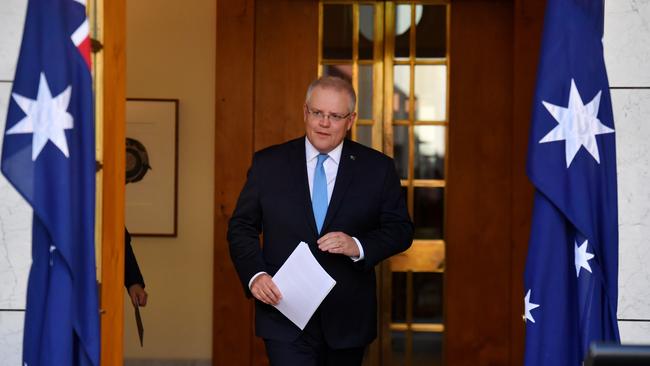
Read the full story here.


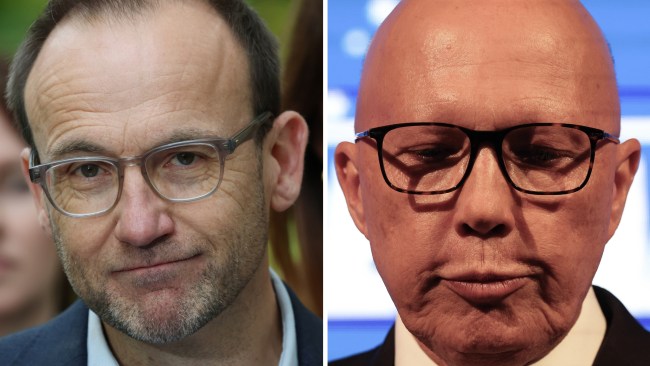
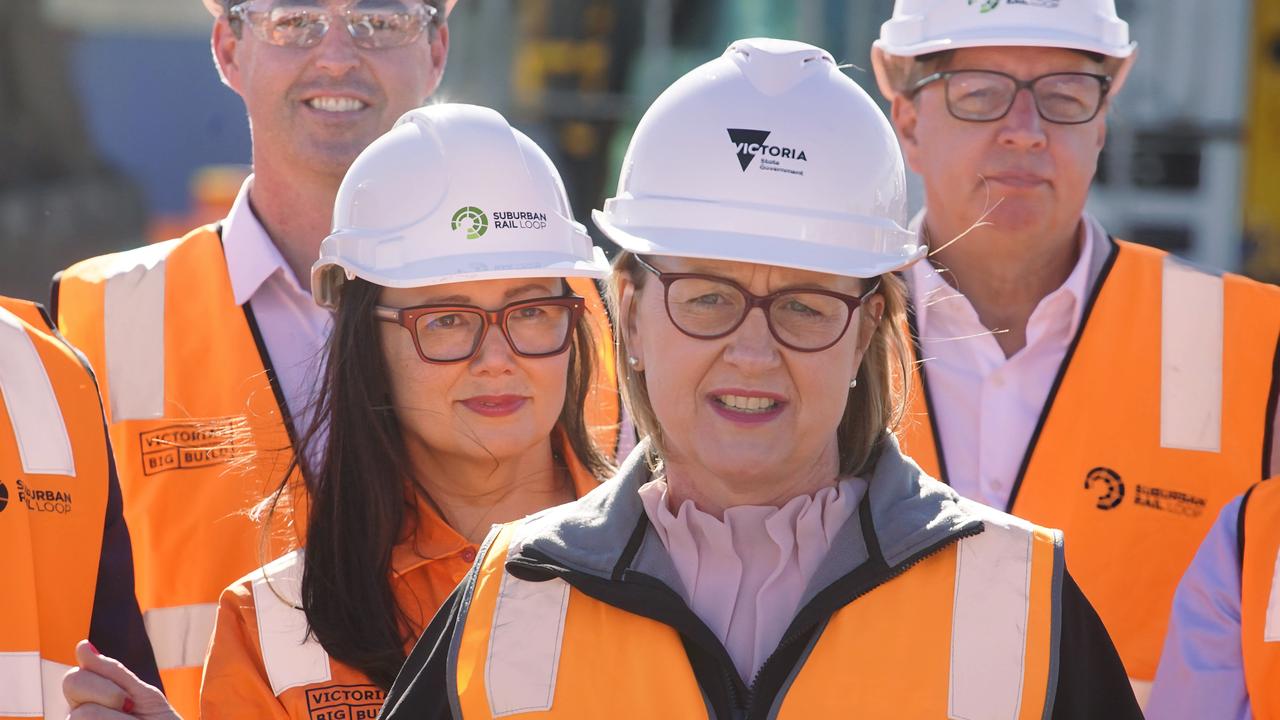
To join the conversation, please log in. Don't have an account? Register
Join the conversation, you are commenting as Logout